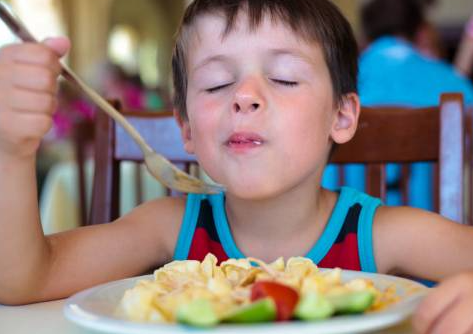Per day, consume 1 to 2 1/2 cups of fruit (older kids need more)
 Each day, consume 1 to 4 cups of vegetables.
Each day, consume 1 to 4 cups of vegetables.Per day, drink 2 to 3 cups of milk (typically fat-free or low-fat for kids who are at least two years old)
Eat 2 to 7 ounces of low-fat or lean meat or chicken, or other Meat and Beans foods like fish, beans, peas, eggs, and so on.
Half of their grains should come from whole grains.
Following these balanced eating guidelines will help your children consume a diet rich in nutrients, low in fat, and containing the calcium, iron, and other vitamins and minerals they need. These suggestions also assist them in eliminating high-calorie, high-fat foods, which may contribute to childhood obesity and other health issues.
Getting Started on a Healthy Eating Plan
If your children aren't eating well, see the food pyramid as a target to achieve and adopt this balanced eating plan to get there:
Every day, give your children at least one serving of fruit.
Every day, give your children at least one vegetable serving.
Every day, give your children at least one serving of nonfat milk (skim milk) or low-fat milk (1 percent or 2 percent milk) or another high-calcium product, such as low-fat milk cheese.
Just drink one serving of 100% fruit juice every day.
The majority of meals are eaten as a family at home.
Every day, have at least one whole grain snack, such as whole wheat bread, oatmeal, or a whole grain breakfast cereal.
Instead of frying foods, try baking, grilling, or roasting them as much as possible.
Instead of refined and prepared kids' meals that are often high in sugar, calories, and salt and low in fiber, prepare and serve whole foods as often as possible.
When it comes to meals and snacks, serve portion sizes that are suitable for your child's age.
If your children learn to make healthier decisions and improve their eating habits, you will gradually step closer to the Choose My Plate recommendations, such as offering them 1 1/2 servings of vegetables a day.
It will take some time, but having a balanced eating plan will assist your children in moving away from needing to eat chicken nuggets and french fries at every meal.
What You Should Do About Balanced Diets
It could also help your kids stick to their balanced eating plan if you:
Avoid flavorings that can make milk less healthy; for example, chocolate milk or strawberry milk flavoring would typically add more sugar and calories to your child's milk serving.
Fried meats, such as chicken nuggets, corn dogs, or fish sticks, should be eaten no more than once a week.
High-fat meats, such as sausage, bacon, hot dogs, or bologna, should be served no more than once a week.
Drinks with a lot of added sugar, such as sweet tea, soda, or fruit punch, as well as fruit drinks that aren't 100 percent fruit juice, should be avoided by your children.
When you do go out to eat at a restaurant, avoid fast food and make healthier choices.
Instead of giving sweets on a daily basis, limit candy, cookies, and cakes to special occasions, and instead give healthier snacks between meals and for dessert.
This balanced eating plan, when paired with daily physical activity on most days, will help your children maintain a healthy weight or even begin to lose weight if they are overweight.









